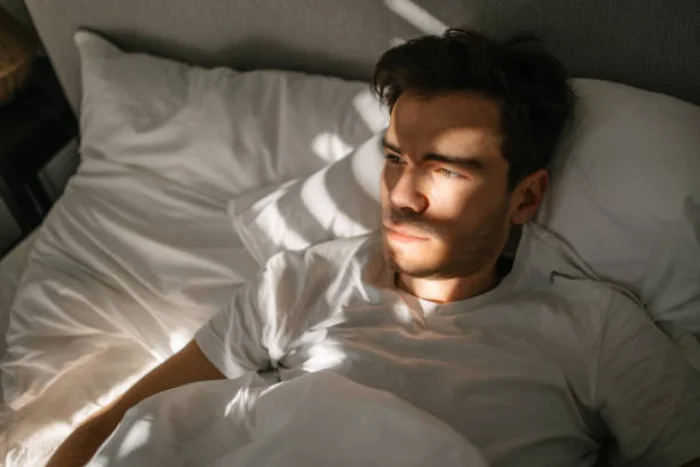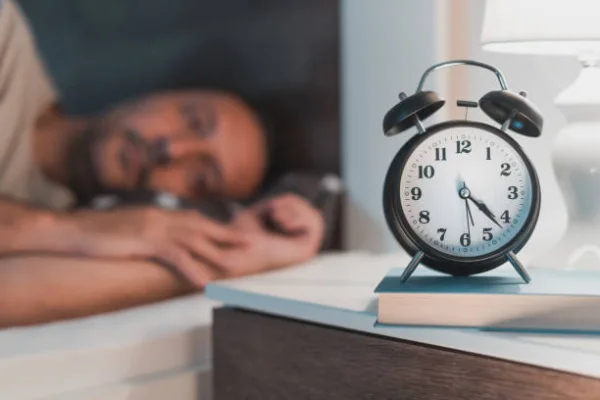Do you struggle to fall asleep due to constant worry and restlessness? If this sounds familiar, you may suffer from sleep anxiety, which affects numerous individuals worldwide. So, how do you fix my sleep anxiety?
Addressing sleep anxiety involves creating a calming bedtime routine that involves minimizing the use of electronic devices and winding down. Ensure the sleeping environment is conducive to rest, with minimal light, noise, and a cool temperature.
Good sleep hygiene practices such as avoiding caffeine and alcohol before bedtime, are also beneficial. Also, challenging negative thoughts contributing to sleep anxiety can alleviate the issue, as can relaxation techniques like deep breathing and meditation.
However, effective management of sleep anxiety is achievable through strategies like cognitive-behavioral therapy and lifestyle changes such as adopting healthy sleep habits.
Below, we will discuss these strategies in more detail and explore other methods of coping with sleep anxiety.
How Do You Fix Sleep Anxiety: The 8 Best Methods
If you’re struggling with sleep anxiety, there are several ways to help improve your quality of rest. Here are some tips to consider:
- No 01: Consult a Healthcare Professional
- No 02: Maintain a Sleep-friendly Environment
- No 03: Practice Good Sleep Hygiene
- No 04: Challenge Negative Thoughts
- No 05: Engage in Relaxation Techniques
- No 06: Seek Therapy
- No 07: Avoid Stimulating Activities Before Bed
- No 08: Limit Bedtime Worries
01: Consult a Healthcare Professional
Healthcare professionals can provide guidance and treatment options based on individual needs. Sleep-related disorders can significantly impact daily life; consulting a specialist may be the best course of action. They can evaluate the situation and consider other treatment options, including necessary medication.
Prescribed medication like Modafinil 200mg may improve sleep quality and reduce anxiety levels. But, you should buy Modafinil 200mg online from a reputable vendor only after consulting with a professional.
02: Maintaining a Sleep-friendly Environment
Creating a calm and peaceful sleep environment is crucial for restful sleep. To achieve this, your bedroom must be cool, dark, and quiet, with comfortable bedding. Keep the room temperature around 65°F and minimize outside noise and light pollution.
Invest in a supportive mattress and pillow that suits your specific needs and preferences. Avoid using electronic devices before bedtime to prevent disrupting your body’s natural circadian rhythm due to blue light exposure.
03: Practicing Good Sleep Hygiene
Good sleep hygiene promotes better sleep quality. This includes following a regular sleep schedule, going to bed and waking up consistently each day. You can also create a comfortable sleep environment by avoiding distracting factors.
To overcome sleep anxiety, a consistent bedtime routine can be practiced. A warm bath, reading, or using soothing techniques are great ways to signal the body to prepare for sleep. You can also buy diazepam 10mg online to help reduce anxiety and stress that can interfere with sleep.
04: Challenging Negative Thoughts
Unhelpful negative thoughts about sleep can contribute to sleep anxiety. Challenge those thoughts and replace them with positive ones that help you rest easier. When you worry about being unable to fall asleep, remind yourself that your body knows how to sleep naturally, and worrying makes it harder to sleep.
Shift the focus from negative aspects of sleep to positive thoughts, like how comfortable your bed is, or visualize a peaceful place.
05: Engaging in Relaxation Techniques
Relaxation techniques are effective for achieving calm, anxiety-free sleep. For example:
- Deep breathing involves taking slow, deep breaths and exhaling slowly to soothe the mind and body.
- Progressive muscle relaxation involves tensing and relaxing different muscle groups to release tension.
- With guided imagery, you visualize a calming image, while mindfulness meditation grounds you in the present without judging yourself.
06: Seek Therapy
Cognitive-Behavioral Therapy for Insomnia (CBT-I) is a specific therapy for sleep-related issues and anxiety. CBT-I includes techniques to challenge unhelpful thought patterns, teach relaxation methods, and establish healthy sleep habits.
Anxiety-focused therapy can also address the root causes of sleep anxiety, identify triggers, explore past experiences, and provide tools to manage symptoms.
07: Avoid Stimulating Activities Before Bed
Anxiety occurs by watching high-intensity movies, challenging tasks, or having heated arguments or conversations.
Opt for relaxing activities instead, such as practicing yoga or meditation or listening to calming sounds. These activities can help calm your body and prepare it for a restful sleep, making slipping into a peaceful slumber easier.
08: Limit Bedtime Worries
Create a designated ‘worry time’ to write down concerns or talk to someone trusted. This technique limits the amount of worrying in bed and prevents a racing mind from keeping you awake.
Also, this technique reduces anxiety overall by providing an outlet for stress and prioritizing what truly needs attention in life. Try setting aside some worry-free time during the day to improve sleep quality at night. And remember to focus on the present and what you can do now rather than worrying about the future.
Why am I getting anxious in my sleep?
Sometimes anxiety can creep into your sleep, leaving you wondering why it’s happening. Several factors, such as genetics, stress, and changes in brain function, contribute to sleep anxiety.
Also, certain medical conditions like sleep disorders or thyroid problems can also cause panic-like symptoms during sleep. Identify the root cause of your sleep anxiety with the help of a healthcare professional so that appropriate treatment can be provided.
This may include therapy, medication, or lifestyle changes to reduce stress and improve overall well-being. Plus, incorporating relaxation techniques such as deep breathing, meditation, and visualization can help bring your body to a more peaceful state.
Combat Sleep Anxiety and Improve Your Overall Health
Creating a consistent sleep schedule and a relaxing bedtime routine can help regulate your sleep-wake cycle and improve overall sleep hygiene. It’s crucial to avoid caffeine, alcohol, and nicotine before bedtime, as they can disrupt your sleep quality.
Also, ensure your bedroom is dark, quiet, and cool, and invest in a comfortable mattress and pillows. Remember that sleep anxiety is a treatable condition, and seeking assistance is the first step toward a good night’s sleep.
Don’t let sleep anxiety take a toll on your physical and mental health. Prioritize your sleep, and seek professional help if necessary. Sweet dreams.




